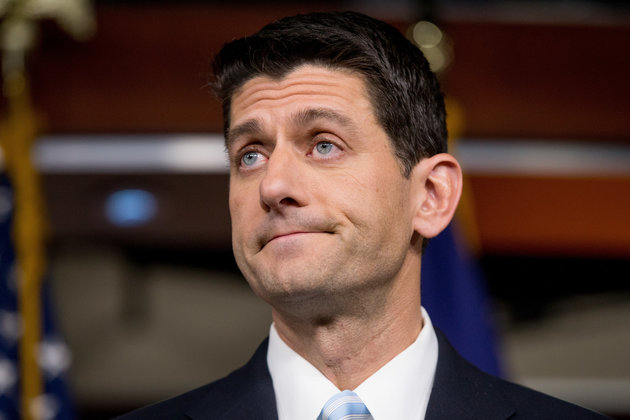
A majority of the House Freedom Caucus voted to support Rep. Paul Ryan (R-Wis.) for House speaker during a closed-door meeting Wednesday evening, apparently putting to rest a tumultuous speaker’s race.
According to Rep. Raul Labrador (R-Idaho), approximately 70 percent of the group of hardline conservatives agreed to back Ryan for the leadership position instead of Rep. Daniel Webster (R-Fla.), who had intended to run for the post. However, the caucus stopped short ofendorsing Ryan, and Labrador said it would be up to Ryan to decide if the signal of support was enough. (The caucus needed to reach 80 percent support to grant an endorsement.)
Ryan, after nearly two weeks of indecision, finally agreed to run for House speaker on Tuesday — on the condition that he receive support from all factions of the party, including the Freedom Caucus. Since he has received that support, Ryan appears to be a lock for the speakership.
“While no consensus exists among members of the House Freedom Caucus regarding Chairman Ryan’s preconditions for serving, we believe that these issues can be resolved within our Conference in due time,” the Freedom Caucus said in a statement.
Rep. Mick Mulvaney (R-S.C.), a founding member of the caucus, indicated Ryan would have enough votes if he decides to stay in the race:
Ryan issued a statement thanking the caucus for its support and calling it “a positive step toward a unified Republican team.”
“I’m grateful for the support of a supermajority of the House Freedom Caucus, I look forward to hearing from the other two caucuses by the end of the week, but I believe this is a positive step toward a unified Republican team,” he said.
Some on Capitol Hill were skeptical Ryan would win over enough of the conservative caucus. HuffPost’s Jennifer Bendery reported earlier Wednesday on how conservatives weren’t fully sold on Ryan:
Party leaders and moderates, who see Ryan as the only one who can unify a GOP conference in disarray, say his terms are fine with them. But tea party lawmakers say he’s asking for way too much — especially for a guy who doesn’t really want the job.
“I’m troubled by an insistence of so many members that we put him in a position that he has shown a reluctance to take,” said Rep. Mo Brooks (R-Ala.), a member of the socially conservative House Freedom Caucus. “He is a father. He has young children. He does not have time to do the speaker job as it’s been done in the past.”
Ryan was eyed as the party’s top choice to replace outgoing House Speaker John Boehner (R-Ohio) after House Majority Leader Kevin McCarthy (R-Calif.) abruptly dropped out of the race earlier this month. The congressman, who was the GOP vice presidential nominee in 2012, faced immense pressure from the party to step in. However, Ryan was reluctant to accept the role, only agreeing to do so if the party united behind him and if he could preserve his work-life balance.
“If I can truly be a unifying figure, then I will gladly serve,” Ryan said after a meeting of the House Republican conference. “And if I am not unifying, that will be fine as well. I’ll be happy to stay where I am.”
The entire Republican conference will vote next week to select their candidate to replace Boehner.














